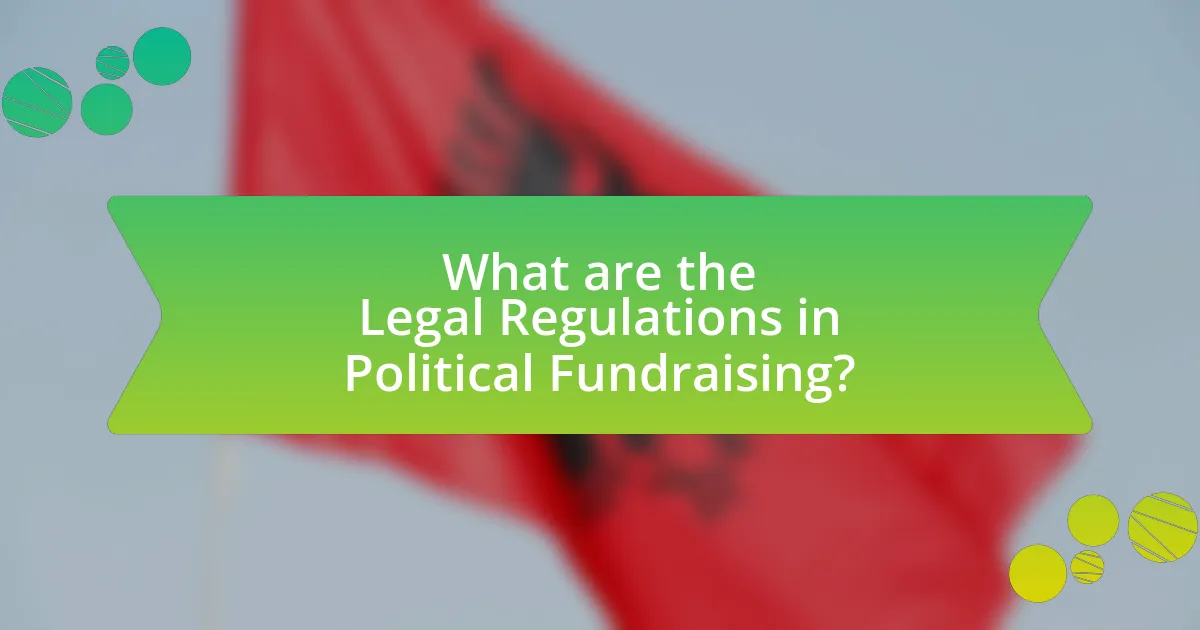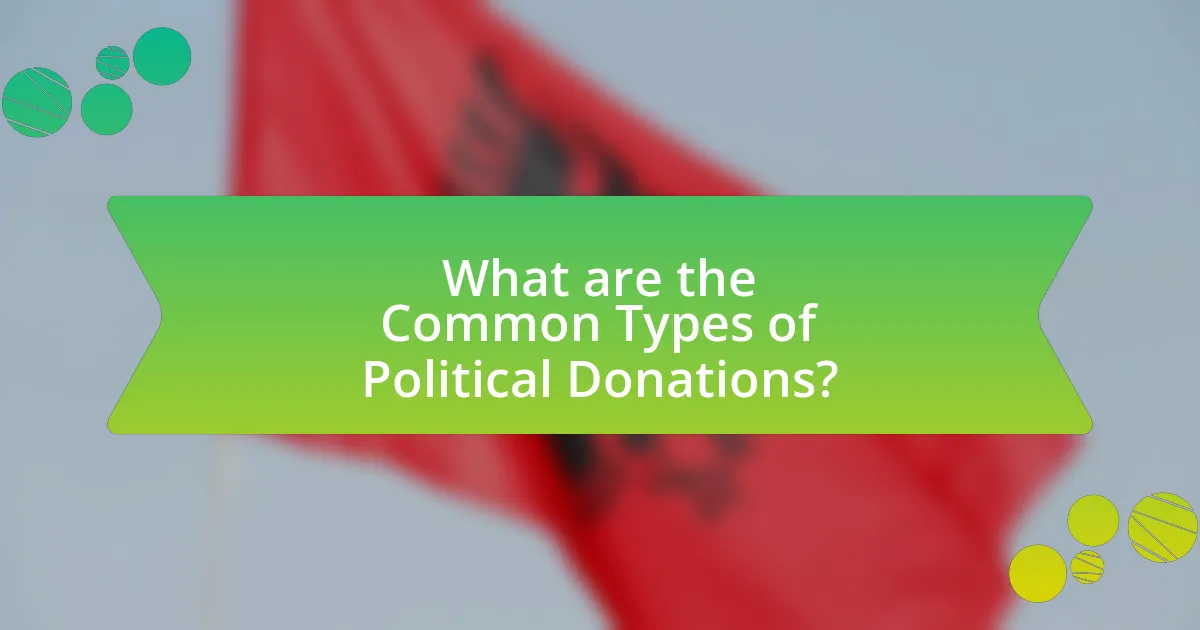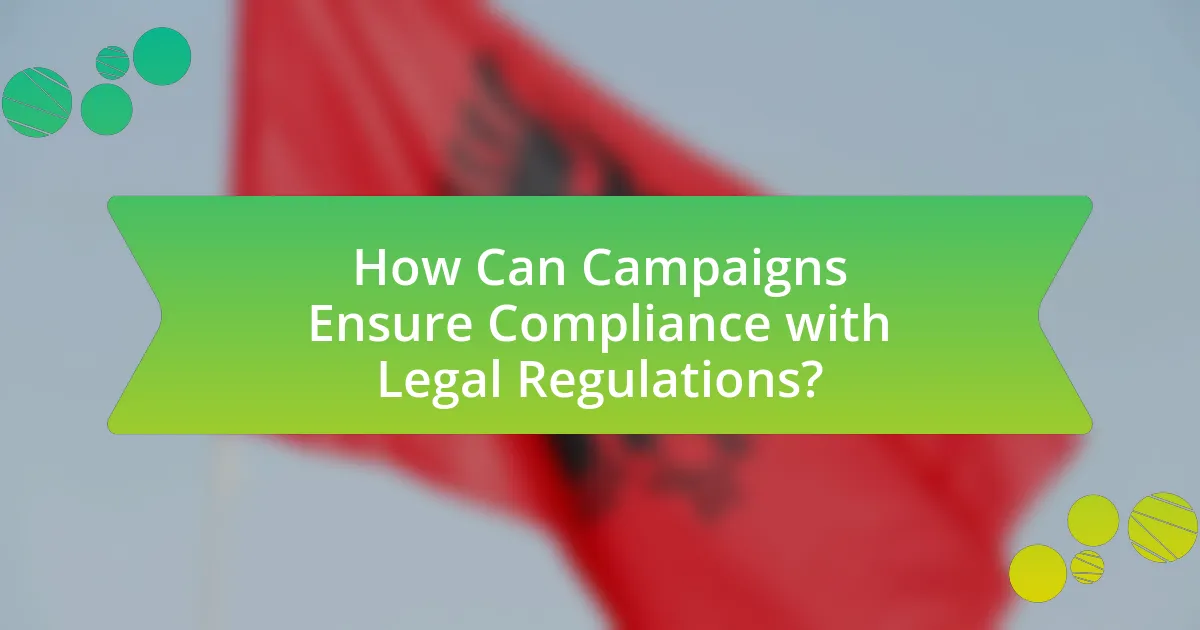The article focuses on navigating legal regulations in political fundraising, primarily governed by the Federal Election Commission (FEC) in the United States. It outlines key federal laws, such as the Federal Election Campaign Act and the Bipartisan Campaign Reform Act, which establish contribution limits and disclosure requirements. The article also discusses the variations in regulations across different jurisdictions, the importance of compliance to ensure transparency and accountability, and the risks associated with violations. Additionally, it highlights best practices for maintaining accurate financial records and the resources available for understanding and adhering to fundraising laws.

What are the Legal Regulations in Political Fundraising?
Legal regulations in political fundraising are governed primarily by the Federal Election Commission (FEC) in the United States, which enforces laws regarding campaign finance. These regulations include limits on contributions from individuals and organizations, mandatory reporting of contributions and expenditures, and restrictions on the sources of funds, such as prohibiting foreign contributions. For instance, individuals can contribute a maximum of $2,900 per election to a candidate, while political action committees (PACs) have different limits. Additionally, candidates must disclose their financial activities, ensuring transparency and accountability in the fundraising process.
How do these regulations vary by jurisdiction?
Regulations governing political fundraising vary significantly by jurisdiction, with each state or country establishing its own rules regarding contribution limits, disclosure requirements, and permissible funding sources. For instance, in the United States, federal regulations set certain limits on contributions to candidates, while individual states may impose stricter or more lenient rules; for example, California has a contribution limit of $4,700 per election for statewide candidates, whereas Texas allows contributions without a limit. Additionally, some jurisdictions require detailed reporting of contributions and expenditures, while others have minimal disclosure requirements. This variation is influenced by local political culture, historical context, and the level of enforcement of campaign finance laws.
What are the key federal laws governing political fundraising?
The key federal laws governing political fundraising include the Federal Election Campaign Act (FECA), the Bipartisan Campaign Reform Act (BCRA), and regulations enforced by the Federal Election Commission (FEC). FECA, enacted in 1971 and amended several times, establishes limits on contributions to candidates and requires disclosure of campaign finance information. The BCRA, passed in 2002, further regulates the financing of political campaigns by prohibiting soft money contributions to national parties and imposing stricter rules on the disclosure of campaign advertisements. The FEC oversees compliance with these laws, ensuring transparency and accountability in political fundraising activities.
How do state laws differ from federal regulations?
State laws differ from federal regulations primarily in their scope and authority, with state laws governing specific local issues while federal regulations apply nationwide. For example, in political fundraising, federal law sets limits on contributions to candidates and requires disclosure of donors, as outlined in the Federal Election Campaign Act. In contrast, state laws can impose additional restrictions or requirements, such as varying contribution limits or specific reporting deadlines, which can differ significantly from federal standards. This variation means that political fundraising activities must comply with both federal and state laws, necessitating careful navigation to ensure compliance with all applicable regulations.
Why are these regulations important for political campaigns?
Regulations are important for political campaigns because they ensure transparency, fairness, and accountability in the electoral process. These regulations help prevent corruption by limiting the amount of money that can be contributed to campaigns, thereby reducing the influence of wealthy donors on political decisions. For instance, the Federal Election Commission (FEC) enforces contribution limits and requires disclosure of campaign finances, which promotes public trust in the democratic process. Studies have shown that transparency in campaign financing leads to increased voter confidence and participation, as citizens are more likely to engage in elections when they believe the process is fair and regulated.
What risks do campaigns face if they violate these regulations?
Campaigns face significant legal and financial risks if they violate regulations in political fundraising. These risks include hefty fines imposed by regulatory bodies, which can reach thousands or even millions of dollars depending on the severity of the violation. Additionally, campaigns may face criminal charges, leading to potential imprisonment for campaign officials. Violations can also result in reputational damage, causing a loss of public trust and support, which can adversely affect future fundraising efforts. For instance, the Federal Election Commission (FEC) has enforced penalties against campaigns for failing to report contributions accurately, highlighting the serious consequences of non-compliance.
How do regulations promote transparency in political fundraising?
Regulations promote transparency in political fundraising by mandating disclosure of contributions and expenditures. These regulations require candidates and political organizations to report the sources and amounts of funds received, as well as how those funds are spent. For instance, the Federal Election Commission (FEC) enforces laws that necessitate regular financial reporting, which is publicly accessible, allowing voters to scrutinize the financial backing of candidates. This transparency helps to deter corruption and fosters public trust in the electoral process by ensuring that all financial activities are open to examination.

What are the Common Types of Political Donations?
Common types of political donations include individual contributions, political action committee (PAC) donations, and party contributions. Individual contributions are direct donations made by voters to candidates or political parties, often subject to limits set by federal and state laws. Political action committees (PACs) collect funds from members and donate to candidates, typically representing specific interests or industries. Party contributions refer to funds given directly to political parties, which can then allocate resources to candidates within the party. These donation types are regulated under the Federal Election Commission guidelines, which establish limits and reporting requirements to ensure transparency in political fundraising.
What distinguishes individual contributions from corporate donations?
Individual contributions are personal financial donations made by individuals, while corporate donations are funds provided by businesses or organizations. The key distinction lies in the source of the funds; individual contributions come from personal income, whereas corporate donations originate from company profits. Additionally, legal regulations often treat these two types of donations differently; for instance, many jurisdictions impose limits on individual contributions to political campaigns, while corporate donations may be subject to stricter regulations or outright bans in certain contexts. This differentiation is crucial for compliance with campaign finance laws, which vary by state and federal guidelines.
What are the limits on individual contributions to political campaigns?
The limit on individual contributions to political campaigns is $2,900 per election for federal candidates as of 2023. This limit applies to both primary and general elections, meaning an individual can contribute a total of $5,800 to a candidate in a single election cycle. Additionally, individuals can contribute up to $10,000 to state and local party committees and $35,500 to national party committees per year. These limits are established by the Federal Election Commission to regulate campaign financing and ensure transparency in political fundraising.
How do corporate donations impact political fundraising?
Corporate donations significantly enhance political fundraising by providing substantial financial resources that candidates and parties can leverage for campaign activities. These donations often lead to increased visibility and outreach, allowing candidates to amplify their messages and engage with a broader electorate. For instance, according to the Center for Responsive Politics, in the 2020 election cycle, corporate contributions accounted for over $1 billion in political spending, illustrating their critical role in shaping campaign strategies and outcomes. Furthermore, corporate donations can create a network of influence, as companies often expect favorable policies or legislation in return, thereby intertwining corporate interests with political agendas.
What are the rules regarding in-kind contributions?
In-kind contributions refer to non-monetary donations made to a political campaign, such as goods or services. The rules governing in-kind contributions require that they be reported in the same manner as monetary contributions, adhering to the limits set by the Federal Election Commission (FEC). Specifically, the value of the in-kind contribution must be assessed at fair market value and disclosed on campaign finance reports. Additionally, in-kind contributions are subject to the same contribution limits as cash donations, which, for individuals, is capped at $2,900 per election cycle as of 2021. Failure to accurately report in-kind contributions can result in penalties, as outlined in the Federal Election Campaign Act.
How should campaigns report in-kind contributions?
Campaigns should report in-kind contributions by accurately valuing and disclosing them in their financial reports. In-kind contributions, which include goods or services provided without charge, must be assigned a fair market value and reported as both a contribution received and an expenditure made. This ensures compliance with legal regulations, such as those outlined by the Federal Election Commission, which mandates that all contributions, including in-kind, be reported in a timely and transparent manner. Accurate reporting helps maintain the integrity of the campaign’s financial disclosures and adheres to the legal requirements governing political fundraising.
What are the implications of failing to report these contributions?
Failing to report contributions in political fundraising can lead to severe legal repercussions, including fines and penalties. Regulatory bodies, such as the Federal Election Commission (FEC) in the United States, impose strict reporting requirements to ensure transparency and accountability in campaign financing. Non-compliance can result in investigations, which may damage the reputation of the involved parties and hinder future fundraising efforts. Additionally, failure to disclose contributions can undermine public trust in the political process, as voters may perceive a lack of integrity and transparency in campaign financing practices.

How Can Campaigns Ensure Compliance with Legal Regulations?
Campaigns can ensure compliance with legal regulations by implementing robust legal frameworks and regular audits. Establishing clear guidelines based on federal, state, and local laws governing political fundraising is essential, as these laws dictate contribution limits, reporting requirements, and permissible activities. Regular audits help identify any discrepancies or potential violations, allowing campaigns to address issues proactively. For instance, the Federal Election Commission (FEC) mandates that campaigns file detailed financial reports, and failure to comply can result in penalties. By adhering to these regulations and conducting periodic reviews, campaigns can maintain legal compliance and avoid legal repercussions.
What best practices should campaigns follow for compliance?
Campaigns should adhere to transparency, accurate reporting, and adherence to contribution limits to ensure compliance with legal regulations in political fundraising. Transparency involves disclosing the sources of funding and expenditures, which helps build trust and accountability. Accurate reporting requires timely and precise submission of financial records to relevant authorities, ensuring that all contributions and expenditures are documented correctly. Adhering to contribution limits is crucial, as exceeding these limits can lead to legal penalties; for instance, the Federal Election Commission sets specific limits on individual contributions to candidates, which campaigns must follow to avoid violations.
How can campaigns maintain accurate financial records?
Campaigns can maintain accurate financial records by implementing a systematic approach to tracking all income and expenditures. This includes using accounting software specifically designed for campaign finance, which allows for real-time updates and categorization of transactions. Regular reconciliation of bank statements with recorded transactions ensures discrepancies are identified and corrected promptly. Additionally, maintaining detailed documentation for all financial activities, such as receipts and invoices, supports transparency and compliance with legal regulations. According to the Federal Election Commission, accurate record-keeping is essential for meeting reporting requirements and avoiding potential penalties.
What role does training play in ensuring compliance?
Training plays a critical role in ensuring compliance by equipping individuals with the necessary knowledge and skills to understand and adhere to legal regulations. Effective training programs provide clear guidelines on compliance requirements, helping participants recognize potential legal pitfalls in political fundraising. For instance, organizations that implement comprehensive training can reduce the risk of violations; a study by the Compliance and Ethics Institute found that companies with robust training programs experienced a 50% decrease in compliance-related incidents. This evidence underscores the importance of training as a proactive measure to foster a culture of compliance and mitigate legal risks in political fundraising activities.
What resources are available for navigating legal regulations?
Resources available for navigating legal regulations in political fundraising include government websites, legal databases, and nonprofit organizations specializing in campaign finance law. Government websites, such as the Federal Election Commission (FEC) and state election offices, provide official guidelines and updates on legal requirements. Legal databases like Westlaw and LexisNexis offer access to case law, statutes, and legal commentary relevant to campaign finance. Additionally, organizations such as the Campaign Legal Center and the National Association of Secretaries of State provide educational materials and support for compliance with fundraising regulations. These resources are essential for understanding and adhering to the complex legal landscape of political fundraising.
How can legal counsel assist in understanding fundraising laws?
Legal counsel can assist in understanding fundraising laws by providing expert guidance on compliance with federal, state, and local regulations. They interpret complex legal language, ensuring that organizations adhere to rules governing contributions, reporting requirements, and permissible fundraising activities. For instance, legal counsel can clarify the Federal Election Commission’s regulations, which dictate contribution limits and disclosure obligations for political fundraising. Their expertise helps organizations avoid legal pitfalls, ensuring that fundraising efforts are both effective and lawful.
What online tools can help track compliance with regulations?
Online tools that can help track compliance with regulations in political fundraising include software like ComplianceBridge, which offers features for managing compliance documentation and tracking regulatory changes. Additionally, tools such as Donorbox provide built-in compliance checks for fundraising activities, ensuring adherence to local and federal laws. These tools are designed to streamline the compliance process, reduce the risk of violations, and maintain accurate records, which is essential for organizations involved in political fundraising.
What are the key takeaways for successful political fundraising compliance?
Successful political fundraising compliance requires adherence to federal, state, and local regulations governing campaign contributions and expenditures. Key takeaways include understanding contribution limits, ensuring proper reporting of donations, and maintaining accurate records of all financial transactions. For instance, the Federal Election Commission mandates that candidates report contributions exceeding $200, which emphasizes the importance of transparency and accountability in fundraising efforts. Additionally, organizations must be aware of prohibited sources of contributions, such as foreign entities, to avoid legal repercussions. Compliance with these regulations not only safeguards against penalties but also fosters trust with donors and constituents.






